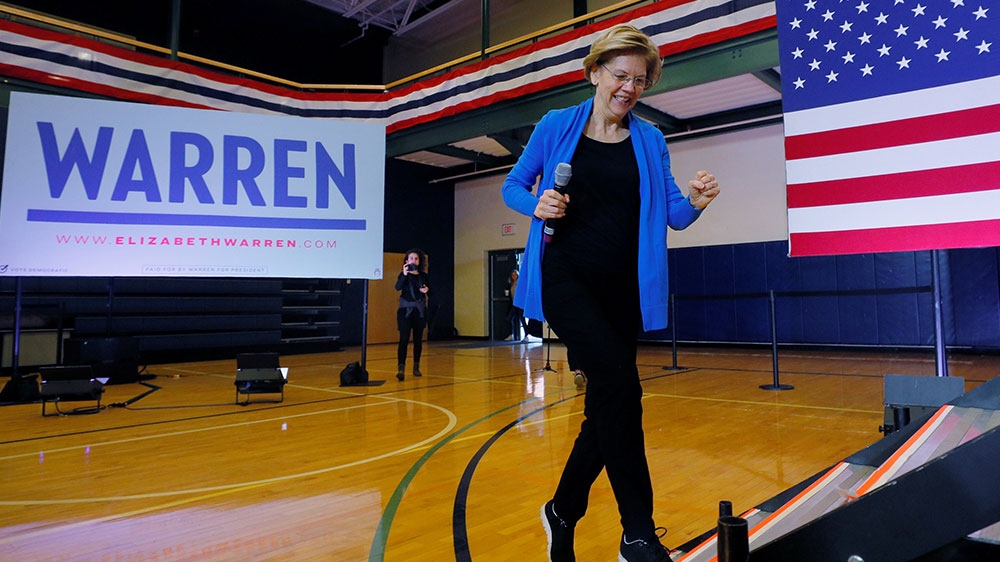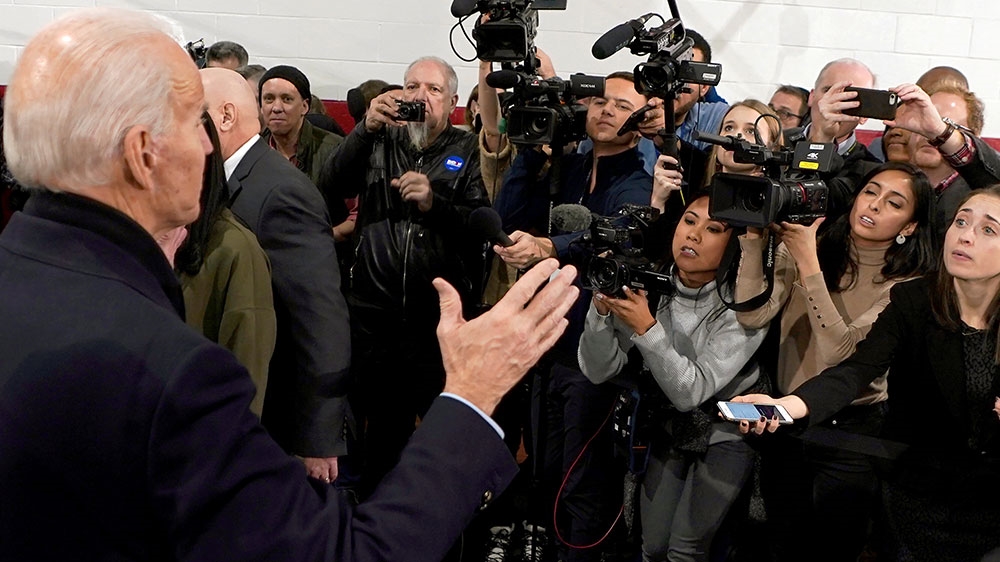After Iowa chaos, 2020 candidates charge ahead in New Hampshire
What effect will the ‘Iowa caucus disaster’ have on Tuesday’s New Hampshire primary?

Ames, Iowa – Seventy-two hours have passed since the Iowa caucuses, and the state’s Democrats still have not released the final results.
With 97 percent of precincts counted, South Bend, Indiana, Mayor Pete Buttigieg and Senator Bernie Sanders were virtually tied in the delegate count race. Senator Elizabeth Warren, former Vice President Joe Biden and Senator Amy Klobuchar trailed behind.
Keep reading
list of 3 itemsWho has dropped out of the US 2020 presidential race?
‘Iowa caucus disaster’: What went wrong
But on Thursday, the Democratic National Committee (DNC) called for a recanvass of the caucuses amid the troubled process of releasing the results.
“Enough is enough. In light of the problems that have emerged in the implementation of the delegate selection plan and in order to assure public confidence in the results, I am calling on the Iowa Democratic Party to immediately begin a recanvass,” Perez tweeted.
Regardless of how the rankings play out, Dennis Goldford, professor of political science at Drake University, said the effects will linger.
“The impact will be forever clouded by the reporting problems,” Goldford said.
With the DNC’s demand, it is now unclear whether final and official results will come out before Tuesday, when the country witnesses its first primary of the 2020 nominating contest season.
Regardless, the candidates have charged ahead. Less than 24 hours after the caucuses, most were already in New Hampshire for the last stretch of campaigning before Tuesday’s primary.

Traditionally, the first caucus has slimmed down the field, with announcements from less successful candidates that they are dropping out of the race. But so far, no one has ended his or her bid, and while those who did perform well acknowledge their defeat – Biden called the partial results a “gut punch” and entrepreneur Andrew Yang laid off dozens of staffers as part of a “restructuring” to “compete as the New Hampshire primary approaches” – many appear to be capitalising on even the partial results or just trying to move on.
“I’m confident that we’re going to do really well here in New Hampshire, having won Iowa. We’re going to do very well in Nevada,” Sanders was quoted by The The Associated Press news agency as saying after declaring victory in Iowa even with only partial results.
“I think we’ll do a lot better than people think in South Carolina. I think we’ve got a good shot to win California. And bottom line, I believe that we are well-positioned to win the Democratic nomination and to defeat the most dangerous president in the modern history of this country process,” Sanders said.
Buttigeig, who has also declared victory in Iowa, said his positive showing in Iowa “brings us into the next contest in New Hampshire with just a tremendous amount of momentum”.
Speaking to ABC’s The View programme, the former mayor said that is because his campaign was “able to show, not just in the fact that we reached this positive, but how we did it, that we’re together a kind of politics.”
He added: “It’s about addition, it’s about welcoming people in.”

Warren, speaking to a CNN Town Hall, said she was delighted to be in New Hampshire now, but also “building out all across the country”.
“We’ve got 55 more states and territories (in the primary). I’m in 31 states now with a 1,000 (paid organisers) on the ground,” she added.
‘A little more complicated’
Going into the Iowa caucuses, a RealClearPolitics average of polls, showed New Hampshire voters favouring Sanders, who won its primary in 2016 against former Secretary of State Hillary Clinton, who went on to win the nomination. Biden was polling second, ahead of Buttigieg and Warren.
Dante Scala, a professor of political science at the University of New Hampshire, said that New Hampshire voters – who often go in a different direction – still take the results of Iowa into consideration when forming their own decisions.
“It’s a little more complicated this time around. We’re getting Iowa results, but we’re getting them in this fragmentary way that’s being drawn out over several days, rather than getting them all at once,” Scala said. “It will weigh into people’s decisions, but it won’t dictate it.”

Scala said he sees supporters of Sanders being less swayed by Iowa’s final results, regardless of whether he places first or second. Biden, however, has already failed to demonstrate clear electability and “clear a lane for himself” among the moderate choices.
Scala’s colleague, Andrew Smith, also a professor of political science at the University of New Hampshire and the director of the UNH Survey Center, agreed that Biden faces stiffer competition going forward, noting that Biden has invested fewer resources into New Hampshire than he did in Iowa.
At the same time, other distractions this week like President Donald Trump‘s State of the Union speech and the president acquittal in the Senate impeachment trial will “hide” some of Biden’s weak performance.
